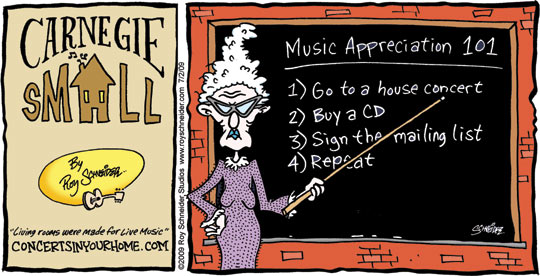The Host in Control: Turning a crowd into an audience.
What should a host do to insure that they will be able to gather a respectful and attentive audience for a house concert? This is part of a how-to-series from ConcertsInYourHome.com, written by Fran Snyder.
Controlling the audience is an important skill for hosts as well as for performers. Imagine, making great effort to get your friends to your house so they can hear an artist you really love and want to support. Everyone arrives in good spirits, catching up with old friends, sharing funny stories, and getting lost in the normal get together stuff.
Then, despite your best efforts, when it's time for the show to start, you can't seem to get everyone seated and quiet. A few folks head outside for a smoke, a few guests have already had too much to drink, and some insist on standing in the back so they can "discreetly" keep chatting.
The smokers keep going in and out, the drunks are whispering louder than most people yell, and the guys in the back are just loud enough to annoy the people in front of them.
A nightmare. Might as well be a noisy club show, right?
Basics:
As a house concert host, it is your responsibility to educate your invitees, and to manage their expectations. This is especially true when you are first starting out, when you haven't built a core audience that will set the right example at every show.
You set the right expectations with the first email. You continue to establish control with every conversation and every invitation. It's part of the show's introduction, the intermission, and the closing goodbye. It's a CONCERT. Emphasize the word. Don't let anyone get the impression that it's a party with music.
If your house concert isn't promoted as a CONCERT, getting your new attendees to behave like an audience will be an uphill battle. Remember, you'll want your invitees to bring their spouse or a friend, and they will most likely have to explain what a house concert is. If you aren't clear about it, you can bet they will not explain it well to others.
Consider:
Even the most seasoned performer can lose their spark when they have to work to get the crowd's attention. Instead of playing music, being warm and comfortable, they start spotting problems and plotting solutions, and this lovely experience we call music starts to look and feel like a job. If that job necessitates announcements for people to shut up and be respectful, no one wins. The artist will not sell as many CDs, and your audience will have missed the opportunity for a truly inspiring experience. Some may not come back next time.
Tips:
- Make sure your flyers, invitations, and emails say "concert" and not "party." Even though house concerts can turn into very festive events (with certain performers) – let that be the surprise.
- As people arrive (or ahead of time) pull a few of your friends aside and ask them to take seats in the front row when the time comes. Unless the artist is well-known, new audience members have a tendency select seats like they are entering algebra class. Have a few "good students" set the example early.
- Twenty minutes before the show, make an announcement like this… "Hi Everyone, in about 10-15 minutes we'll need to have everyone seated before the concert starts. If you want to use the restroom, or refill your drink, please do that in the next few minutes."
- A few minutes before the show, make the next announcement. "O.K. everyone, please find a seat as we're about to start the show. The first set will be about 40 minutes, and then you'll have a break to stretch your legs, use the restroom or get a refill. Please help us keep distractions to a minimum, silence your phones, and get comfortable."
- Introduce the artist. There is no penalty for being brief. "Hi Everyone, thanks so much for joining us at our (first?) house concert. Tonight we're pleased to bring you, all the way from Lawrence, Kansas, Fran Snyder!" Hopefully, you won't have to goad them for some applause. 8^)
The introduction is a great way for you to stall as the last few people settle in. But wait until they are quiet… make them uncomfortable with your silence if you have to, then smile. "Welcome everybody!…"
Options:
- Even if you are comfortable as a public speaker (OK – it's a living room), this is a great way to get some of your guests involved. If you sense that one of your friends would be good at (or even enjoy) the role of announcer – delegate! Give them 2 or 3 of the cues above so they are prepared, and share the spotlight. If you can, choose someone with a strong and clear voice, who can speak with some authority and a friendly vibe. Even if you reserve the artist introduction for yourself, it's best to have just one person be the other announcer. Having three different announcers would be weird.
- If you aren't up to the job, or forget to delegate it, or just can't find anyone willing, let the artist know at least one hour before the show. Share these tips with them if you like, but a professional artist should be willing to take charge of making an announcement or two. Yes, it's much better if they don't have to.
To join our community of house concert hosts (for free), visit ConcertsInYourHome.com.

